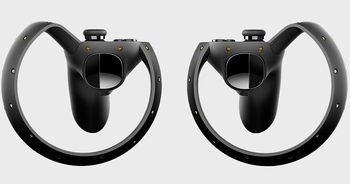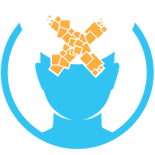Oculus Touch: Difference between revisions
Xinreality (talk | contribs) No edit summary |
Xinreality (talk | contribs) No edit summary |
||
| Line 57: | Line 57: | ||
==Hardware== | ==Hardware== | ||
===Traditional Controls=== | ===Traditional Controls=== | ||
One wireless Oculus Touch is held in each hand. Some of | One wireless Oculus Touch is held in each hand. 2 Oculus Touch controllers are designed to operate simultaneously. Some of the controller's features are similar to a traditional gamepad. It has 1 analog stick and 2 buttons on top. Additionally, it has 2 triggers, 1 for the index finger located in front and 1 for the middle finger on the side. | ||
===Tracking=== | ===Tracking=== | ||
Oculus Touch achieves low latency, 6[[DOF]] tracking through the same system as the [[Rift]] headset. IR LEDs are placed on the controllers' rings, allowing them to be tracked by the same [[positional tracking sensor]] that tracks the [[HMD]]. In addition to [[positional tracking]], controllers possess built-in [[IMU]]s that allow [[rotational tracking]]. | Oculus Touch achieves low latency, 6[[DOF]] tracking through the same system as the [[Rift]] headset. IR LEDs are placed on the controllers' bodies and rings, allowing them to be tracked by the same [[positional tracking sensor]] that tracks the [[HMD]]. In addition to [[positional tracking]], controllers possess built-in [[IMU]]s that allow [[rotational tracking]]. | ||
===Gesture Sensing=== | ===Gesture Sensing=== | ||
The device has an inward facing sensor matrix that can detect hand gestures. | The device has an inward facing sensor matrix that can detect hand gestures. | ||
===Ergonomics=== | |||
==Apps== | ==Apps== | ||
Revision as of 07:40, 27 June 2015
| Oculus Touch | |
|---|---|

| |
| Basic Info | |
| Type | Input Device, Motion Tracker |
| Subtype | Hands/Fingers Tracking, Haptics |
| Platform | Oculus Rift |
| Developer | Oculus VR |
| Release Date | First half 2016 |
| Website | https://www.oculus.com/en-us/rift/ |
| System | |
| Operating System | Windows, Mac, Linux |
| Storage | |
| Display | |
| Image | |
| Optics | |
| Tracking | |
| Tracking | 6DOF |
| Rotational Tracking | IMUs |
| Positional Tracking | External camera sensor |
| Audio | |
| Connectivity | |
| Device | |
| Input | Analog stick, 2 buttons, 2 triggers, hand gestures |
Oculus Touch also known as the Half Moon is the first unique Input Device for the Oculus Rift. One Oculus Touch controller is held in each hand. These devices are wireless and motion tracked by the same positional tracking sensor that tracks the Rift HMD. In addition to traditional gamepad controls such as analog stick, buttons and triggers, Oculus Touch is able to detect hand gestures and provide haptic feeback.
Oculus Touch was revealed alongside Oculus Rift CV1, on June 11, 2015 during Oculus VR's Pre-E3 Special Live Event.
Features
- Hand presence
- Manipulation - precise manipulation of virtual objects
- Low mental load
- Communicative gestures - for social interactions.
- Transitional inputs -
- Lightweight -
Hardware
Traditional Controls
One wireless Oculus Touch is held in each hand. 2 Oculus Touch controllers are designed to operate simultaneously. Some of the controller's features are similar to a traditional gamepad. It has 1 analog stick and 2 buttons on top. Additionally, it has 2 triggers, 1 for the index finger located in front and 1 for the middle finger on the side.
Tracking
Oculus Touch achieves low latency, 6DOF tracking through the same system as the Rift headset. IR LEDs are placed on the controllers' bodies and rings, allowing them to be tracked by the same positional tracking sensor that tracks the HMD. In addition to positional tracking, controllers possess built-in IMUs that allow rotational tracking.
Gesture Sensing
The device has an inward facing sensor matrix that can detect hand gestures.
Ergonomics
Apps
Developer
History
Oculus Touch's codename while in development was Half Moon.

